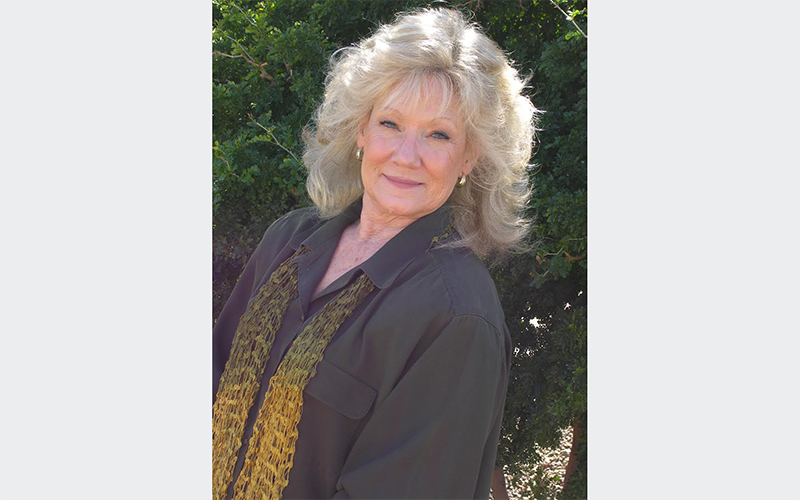
Dark money is especially compromising in an elected position meant to regulate businesses, Shea Stanfield says, and she isn’t accepting campaign donations from corporations. (Photo by Asher Sinclaire/courtesy of Shea Stanfield campaign)

Political affiliation: Democrat
Position sought: Arizona corporation commissioner
City of residence: Scottsdale
Age: Unverified
Career: Teacher, land preservationist, former Cave Creek Town Council member
With the election just days away, Cronkite News is profiling candidates on the Nov. 3 ballot. The five-member Corporation Commission, which was established by the Arizona Constitution, regulates public utilities and decides rate adjustments, assists incorporation of businesses, enforces safety and public service requirements and approves securities matters.
Under the Renewable Energy Standard Tariff, which the commission adopted in 2006, energy companies are required to get 15% of their power from renewable sources by 2025 and charge customers for it through a fee on their bills. Would you change that requirement if elected?
The goal is nothing more than a good start, said Stanfield, who firmly supports the Green New Deal, a sweeping plan for addressing climate change by drastically reducing greenhouse gas emissions. With Arizona tailing a majority of states in energy sustainability, she considers the 15% goal an invitation for utilities to continue business as usual. She blames the intervention of corporate interests.
“One hundred percent by 2050 is where our target is,” she said.
That goal can be reached by incentivizing the switch to renewables and using language lifted from the Green New Deal, a resolution that was introduced in Congress in 2019.
What would factor into your decision to grant or deny a rate hike for a utility company?
Rate increases are a fact of life, and corporate interests should not factor into whether they are granted. Instead of letting businesses decide rate increases to benefit their shareholders, the interests of people come first.
“The focus needs to be on what this means to ratepayers. Where’s this going into effect? How is this going to hurt families? Is there something we can do instead of this?”
Arizona is a large state with multiple ecozones with different needs, she said. She is dedicated to considering every factor and every alternative before making a final decision.
What would factor into your decision to grant or deny a rate hike for a utility company?
“We’re not going to shut it off,” she said of electricity, water and high speed internet.
In a state as environmentally volatile as Arizona, it would be criminal to deprive people of the things necessary to survive in the modern world.
Do you have concerns regarding the security of our election?
Stanfield has great faith in the systems in place in Maricopa County, where she lives. The rhetoric surrounding election security is nothing more than fear mongering.
“It’s going to be OK. We’re in this together and we’re going to do this together and it’ll be fine.”
But she is aware of the potential for interference. She places a lot of her confidence on Arizona Secretary of State Kate Hobbs, who oversees elections in the state.
“I think that they have really anticipated problems and are doing something to put safeguards in place. I’m more confident than I’m not. We just have to be vigilant.”
What is the greatest issue Arizona residents face? If elected, how would you address it?
Corporate corruption is the single biggest issue this election. She says that the U.S. Supreme Court decision on Citizens United opened every government position at every level to the influence of “dark money” – dollars that come from donors who are not required to reveal their identities. Although it’s not illegal in Arizona, Stanfield said dark money is especially compromising in a position meant to regulate businesses, and she isn’t accepting campaign donations from corporations. To restore legitimacy to the commission, power must be returned to Arizonans.
“The commission was set up as a fourth arm of government to represent the people.”
What other issues are important to you and your campaign?
A shift toward renewable energy and greener policies is a pillar of her campaign. She said officials should set aggressive goals. She sees possibilities in solar, wind and potentially other forms of renewable energy.
What makes you the best candidate to hold this office?
Stanfield cited her teaching career, advocacy for desert preservation and time in Cave Creek town government. A product of Scottsdale schools, she says her first love is teaching, something she did for 40 years.
She fought hard for open space for hiking trails and recreational areas around metro Phoenix, and is proud of her work to save Spur Cross Ranch in Cave Creek. After an agreement was reached with the town government, the ranch was paid off with a combination of Heritage Fund dollars and a property tax that was paid out-of-pocket, and the ranch was designated as a Maricopa County Conservation Area.
Stanfield later was appointed to Cave Creek’s planning and zoning commission, where she routinely presented cases to the adjustment board. She also served on the Town Council for two years, sometimes butting heads with the Corporation Commission.
“I got a little bit of everything to prepare me for what I may be doing on this commission.”
What is a personal challenge you feel you need to overcome?
Although she has held local office, “A state race is a whole different leopard.”
Taming this leopard can be accomplished through networking. Petitions, postcards and phone calls were integral to getting her campaign off the ground.
“It’s pretty much the candidate and our little handful of volunteers. And then all the fabulous people that I’ve met all over the state that have picked up the ball and said, ‘We’re going to help.'”
Please share a quote or advice that you live by
Stanfield paraphrased two comments from Mark Twain.
One is to not let school get in the way of your education. That’s important because education involves more reading from a textbook.
“Education is that personal experience, those mistakes you make, those times you correct up and you regroup and go off in the next direction.”
Another comment from Twain is one to live by, she said, but aptly describes politics: “When all is said and done, there’s more said than done.”
Campaign website: sheastanfield.com
 Want more on the 2020 elections? Cronkite News, Arizona PBS and Indian Country Today have teamed up to bring you comprehensive election coverage. Click here for more.
Want more on the 2020 elections? Cronkite News, Arizona PBS and Indian Country Today have teamed up to bring you comprehensive election coverage. Click here for more.